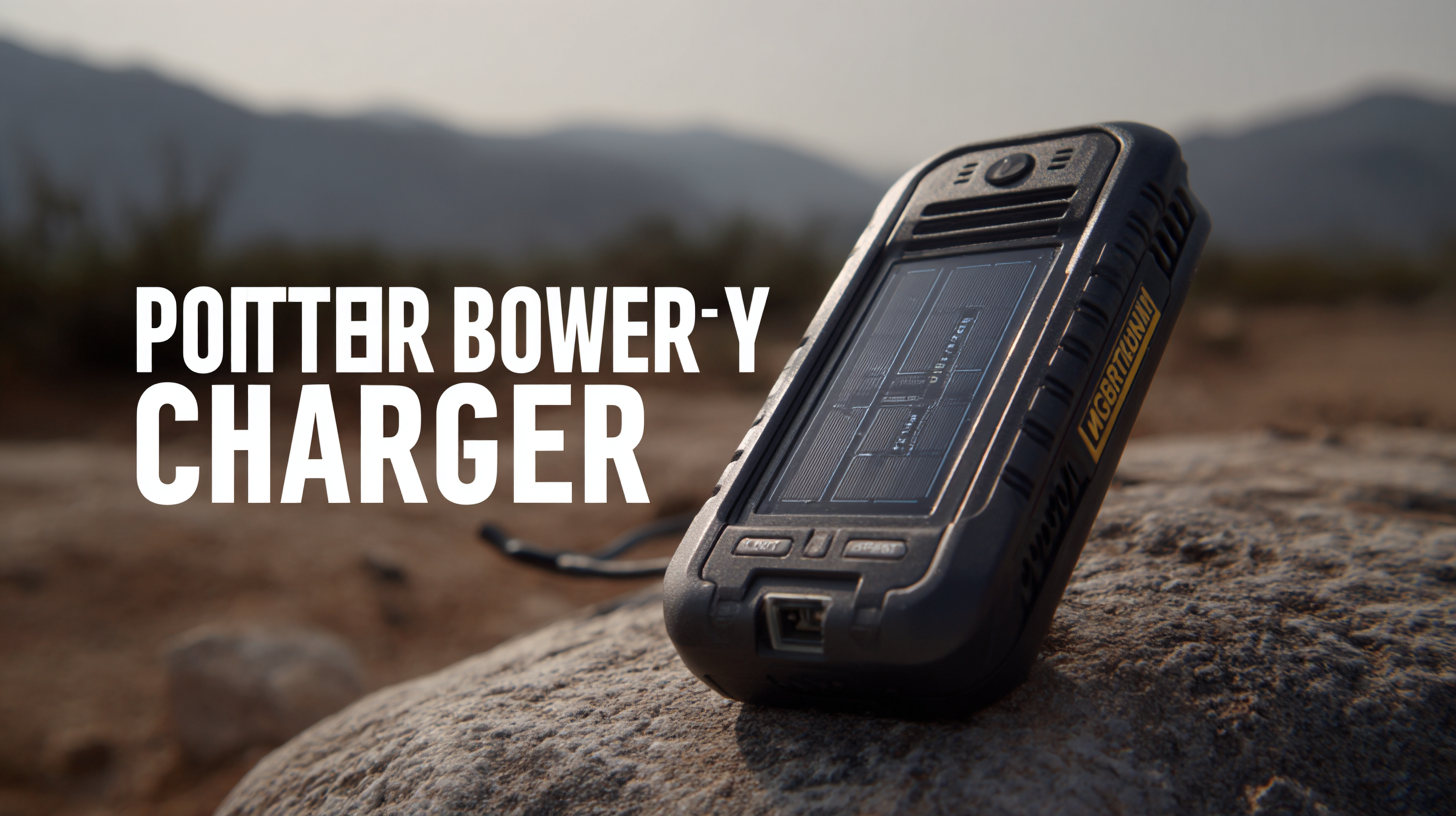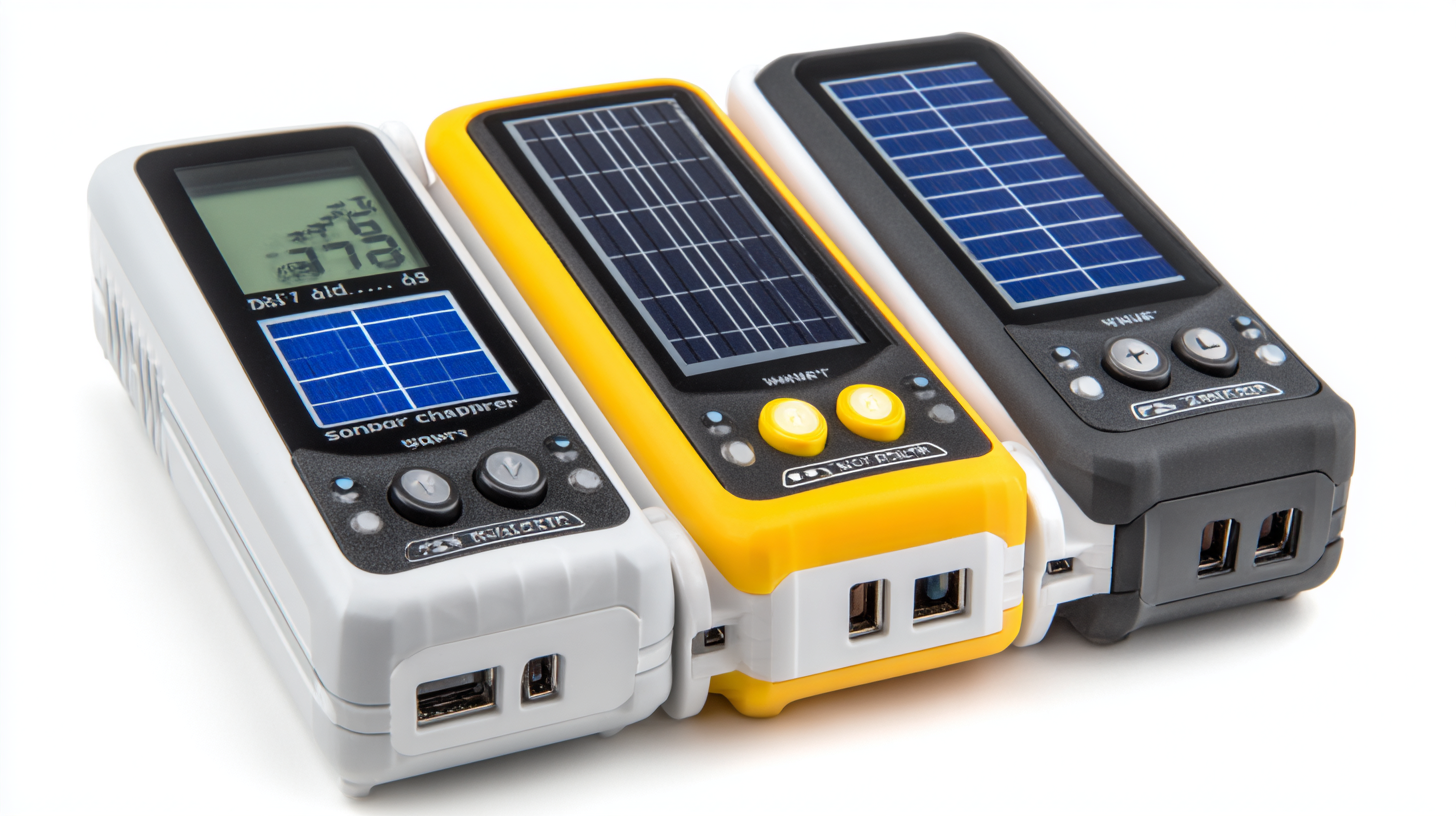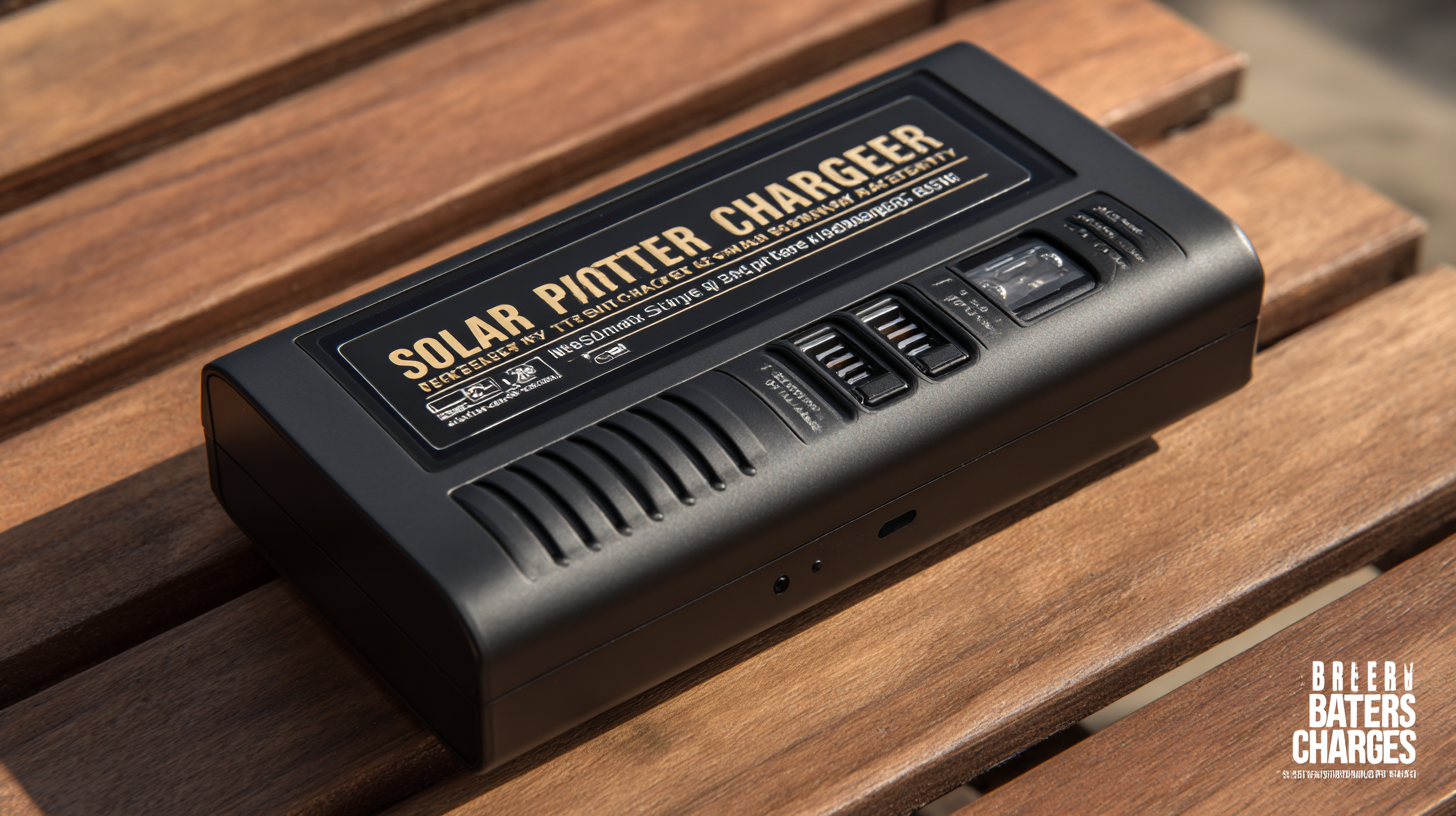
Top Strategies for Choosing the Best Solar Powered Battery Charger for Your Business Needs
 In today's rapidly evolving energy landscape, businesses are increasingly turning to sustainable solutions to enhance their operations and reduce their carbon footprints. One such innovative approach is the adoption of Solar Powered Battery Chargers, which not only help lower energy costs but also promote a more environmentally friendly business model. According to a report by the International Renewable Energy Agency (IRENA), the solar power sector is projected to grow by over 20% annually, reflecting its rising importance in both commercial and residential applications. As a result, selecting the right Solar Powered Battery Charger is essential for businesses seeking efficiency and reliability. This blog will explore the top strategies for choosing the best solar powered battery charger tailored to your specific business needs, ensuring that you remain competitive and eco-conscious in an increasingly green marketplace.
In today's rapidly evolving energy landscape, businesses are increasingly turning to sustainable solutions to enhance their operations and reduce their carbon footprints. One such innovative approach is the adoption of Solar Powered Battery Chargers, which not only help lower energy costs but also promote a more environmentally friendly business model. According to a report by the International Renewable Energy Agency (IRENA), the solar power sector is projected to grow by over 20% annually, reflecting its rising importance in both commercial and residential applications. As a result, selecting the right Solar Powered Battery Charger is essential for businesses seeking efficiency and reliability. This blog will explore the top strategies for choosing the best solar powered battery charger tailored to your specific business needs, ensuring that you remain competitive and eco-conscious in an increasingly green marketplace.
Understanding Your Business's Power Needs for Solar Chargers
When choosing the best solar powered battery charger for your business, understanding your power needs is crucial. According to the National Renewable Energy Laboratory, businesses can significantly reduce energy costs by integrating solar solutions, potentially saving up to 75% on electricity bills over a 25-year period. This impressive figure highlights the importance of accurately assessing your energy consumption and identifying how much power you actually require to make an informed decision about the type of solar charger needed.
**Tip:** Start by reviewing your business's monthly energy usage. Identify essential devices that require continuous power and calculate the wattage needed for these devices. Solar chargers vary in output, so knowing your requirements will help in selecting a model that meets your energy demands.
Additionally, consider the solar charger’s capacity. According to a report by the Solar Energy Industries Association, a larger capacity solar charger can store more energy, reducing reliance on traditional power sources. If your business operates outdoors or in remote areas, a higher capacity charger can ensure that you have sufficient energy available throughout the day.
**Tip:** Opt for a solar powered battery charger with a built-in inverter if your business requires AC power for larger equipment. This feature allows greater flexibility and efficiency in managing your energy needs.

Key Features to Look for in Quality Solar Powered Battery Chargers
When selecting a solar powered battery charger for your business,
understanding the key features that define a quality product is crucial. One important factor to consider
is the charger’s efficiency, typically measured as a percentage of solar energy converted into
usable power. According to the NREL, the average efficiency of solar panels can range
from 15% to 22%. Therefore, opting for a charger with
higher efficiency ratings will ensure that more sunlight is converted into energy, maximizing your
return on investment.
Another essential feature is the durability and weather resistance
of the charger. Given that solar battery chargers are often exposed to various environmental conditions,
they should be made from high-quality materials that can withstand rain, snow, and extreme temperatures.
Industry research indicates that products with an IP67 rating
are dust-tight and can endure immersion in water up to 1 meter, making them particularly reliable for
outdoor use. Additionally, chargers with built-in safety features, such as overcharge protection
and short-circuit prevention, can safeguard your batteries and ensure longevity, aligning with your
business’s sustainability goals.
Assessing Supplier Reliability and Reputation in Solar Technology
When selecting a solar-powered battery charger for your business, assessing supplier reliability and reputation is crucial. A reliable supplier not only ensures the quality of the product but also provides ongoing support and timely deliveries. Begin by researching potential suppliers, focusing on their history in the solar technology industry. Look for reviews and testimonials from previous customers that highlight their experiences with the supplier’s products and services. A supplier with a strong track record in customer satisfaction is more likely to meet your specific business needs.
Additionally, consider certifications and partnerships with reputable solar industry organizations. Suppliers who are recognized by established bodies often adhere to higher standards of quality and performance. Don't hesitate to inquire about warranties and after-sales service. A reputable supplier will back their products, ensuring you have assistance in case of any issues.
By thoroughly assessing the reliability and reputation of your potential solar battery charger suppliers, you can make an informed decision that supports your business's sustainability goals and operational efficiency.
Evaluating Cost vs. Performance in Solar Battery Charger Options
When evaluating solar powered battery chargers for your business, it's crucial to weigh the cost against performance. A high initial price doesn't always guarantee superior efficiency or longevity. Look for products that offer a balance of affordability and features that meet your specific energy needs. Investigate the wattage output and charging speed, as these factors significantly influence performance. It’s also wise to read customer reviews to gauge real-world efficiency and reliability.
Tip 1: Consider the type of batteries your devices require. Some solar chargers are optimized for specific battery types, which can enhance performance and charging speed. Ensure compatibility to maximize your investment.
Tip 2: Assess the quality of materials and build. A more durable solar charger may have a higher upfront cost but can save you money over time through reduced replacements. Look for features like weather resistance if the devices will be used outdoors.
By prioritizing these evaluation criteria, businesses can find solar powered battery chargers that effectively blend cost and performance, ensuring a smart investment in renewable energy.
Top Strategies for Choosing the Best Solar Powered Battery Charger for Your Business Needs - Evaluating Cost vs. Performance in Solar Battery Charger Options
| Model | Battery Type | Solar Panel Output (W) | Charging Time (hrs) | Cost ($) | Performance Rating (1-5) |
|---|---|---|---|---|---|
| Model A | Li-ion | 20 | 5 | 150 | 4 |
| Model B | Lead Acid | 15 | 8 | 100 | 3 |
| Model C | NiMH | 25 | 4 | 180 | 5 |
| Model D | Li-ion | 30 | 6 | 200 | 4.5 |
| Model E | Lead Acid | 10 | 10 | 80 | 2.5 |
Tips for Comparing Different Manufacturers for Optimal Choices
When selecting the best solar-powered battery charger for your business, comparing different manufacturers is crucial to making an optimal choice. According to the latest report by the Solar Energy Industries Association (SEIA), the demand for solar-powered solutions has grown by over 20% in recent years, emphasizing the necessity for businesses to adopt sustainable energy options. In this evolving market, not all manufacturers adhere to the same quality standards or offer the same level of support, making thorough comparisons essential.

One vital factor to consider is the efficiency rating of solar chargers, which can vary significantly from one manufacturer to another. A report released by EnergySage indicates that high-efficiency models can convert up to 22% of sunlight into energy, while lower-quality chargers may only reach efficiency levels of around 14%. Additionally, it is important to assess a manufacturer's warranty and customer service reputation. A study by Consumer Reports found that manufacturers with strong customer support had a 30% higher customer satisfaction rating, signaling the value of reliability in post-purchase service. By focusing on these key areas, businesses can make informed decisions that align with their specific energy needs.

